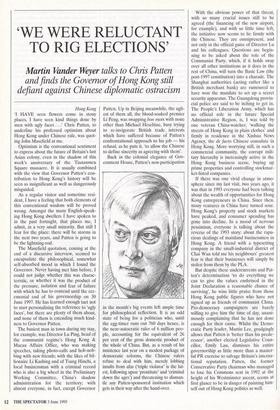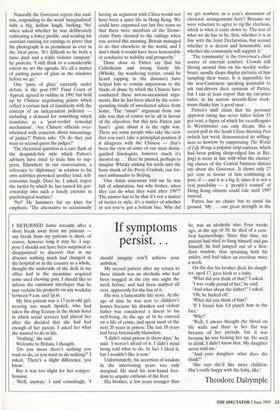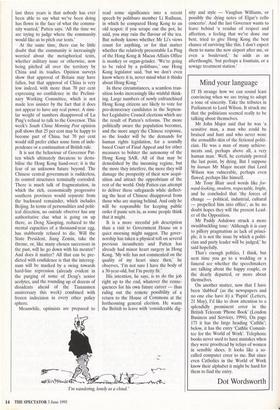`WE WERE RELUCTANT TO RIG ELECTIONS'
Martin Vander Weyer talks to Chris Patten
and finds the Governor of Hong Kong still defiant against Chinese diplomatic ostracism
Hong Kong `I HAVE seen flowers come in stony places, I have seen kind things done by men with ugly faces . . .' Chris Patten, to underline his professed optimism about Hong Kong under Chinese rule, was quot- ing John Masefield at me.
Optimism is the conventional sentiment to express about the future of Britain's last Asian colony, even in the shadow of this week's anniversary of the Tiananmen Square massacre. It is usually combined with the view that Governor Patten's con- tribution to Hong Kong's history will be seen as insignificant as well as dangerously misguided.
As a regular visitor and sometime resi- dent, I have a feeling that both elements of this conventional wisdom will be proved wrong. Amongst the many English-speak- ing Hong Kong dwellers I have spoken to in the past fortnight, that places me, I admit, in a very small minority. But still I fear for the place: there will be storms in the next two years, and Patten is going to be the lightning-rod.
The Masefield quotation, coming at the end of a discursive interview, seemed to encapsulate the philosophical, somewhat self-absorbed mood in which I found the Governor. Never having met him before, I could not judge whether this was charac- teristic, or whether it was the product of the pressure, isolation and fear of failure with which he has to contend until the cer- emonial end of his governorship on 30 June 1997. He has learned enough tact not to start personalising the reference to 'ugly faces', but there are plenty of them about, and none of them is extending much kind- ness to Governor Patten.
The busiest man in town during my stay, for example, was Director Lu Ping, head of the communist regime's Hong Kong & Macau Affairs Office, who was making speeches, taking photo-calls and hobnob- bing with new friends; with the likes of bil- lionaire Li Kashing and of Tsang Hinchi, a local businessman with a criminal record who is also a big wheel in the Preliminary Working Committee, China's shadow administration for the territory; with almost everyone, in fact, except Governor
Patten. Up in Beijing meanwhile, the ugli- est of them all, the blood-soaked premier Li Peng, was swapping bon mots with none other than Michael Heseltine, busy trying to re-invigorate British trade interests which have suffered because of Patten's confrontational approach to his job — his refusal, as he puts it, 'to allow the Chinese to define sincerity as agreeing with them'.
Back in the colonial elegance of Gov- ernment House, Patten's non-participation in the month's big events left ample time for philosophical reflection. It is an odd state of being for a politician who, until the egg-timer runs out 760 days hence, is the near-autocratic ruler of 6 million peo- ple, accounting for the equivalent of 26 per cent of the gross domestic product of the whole of China. But, as a result of his insistence last year on a modest package of democratic reforms, the Chinese rulers refuse to deal with him, merely lobbing insults from afar (`triple violator' is the lat- est, following upon 'prostitute' and 'criminal down the ages') and threatening to disman- tle any Patten-sponsored institution which gets in their way after the hand-over.
With the obvious power of that threat, with so many crucial issues still to be agreed (the financing of the new airport, for example), and with so little time left, the initiative now seems to lie firmly with the Chinese. They are omnipresent, and not only in the official guise of Director Lu and his colleagues. Questions are begin- ning to be asked about the role of the Communist Party, which, if it holds sway over all other institutions as it does in the rest of China, will turn the Basic Law (the post-1997 constitution) into a charade. The Shanghai authorities (acting rather like a British merchant bank) are rumoured to have won the mandate to set up a secret security apparatus. The Guangdong provin- cial police are said to be itching to get in. The People's Liberation Army, which has no official role in the future Special Administrative Region, is, I was told by one veteran China-watcher, 'walking the streets of Hong Kong in plain clothes' and firmly in residence in the Xinhua News Agency, the de facto Chinese consulate in Hong Kong. More worrying still, in such a commercial community, the corrupt mili- tary hierarchy is increasingly active in the Hong Kong business scene, buying up prime properties and controlling stockmar- ket-listed companies.
If there was one vivid change in atmo- sphere since my last visit, two years ago, it was that in 1993 everyone had been talking about the wealth of opportunities for Hong Kong entrepreneurs in China. Since then, many ventures in China have turned sour. Hong Kong's property and stock markets have peaked, and consumer spending has gone into decline. In a mood of nervous pessimism, everyone is talking about the reverse of the 1993 story: about the rapa- cious dealings of mainland businessmen in Hong Kong. A friend with a typesetting company in the small-industrial district of Chai Wan told me his neighbours' greatest fear is that their businesses will simply be stolen from them by the PLA.
But despite these undercurrents and Pat- ten's determination 'to do everything we can to give the values enshrined in the Joint Declaration a reasonable chance of surviving', he wins little praise from those Hong Kong public figures who have not signed up as friends of communist China. Pro-democracy campaigners are barely willing to give him the time of day, unani- mously complaining that he has not done enough for their cause. Whilst the Demo- cratic Party leader, Martin Lee, grudgingly allows that Patten is 'better than his prede- cessor', another elected Legislative Coun- cillor, Emily Lau, dismisses his entire governorship as little more than a master- ful PR exercise to salvage Britain's interna- tional reputation. Patten, the former Conservative Party chairman who managed to lose his Commons seat in 1992 at the height of his Westminster ascent, seems at first glance to be in danger of painting him- self out of Hong Kong politics as well. Naturally the Governor rejects this anal- ysis, responding to the word `marginalised' with a big, hollow laugh, barking `No' when asked whether he was deliberately cultivating a lower profile, and sending his assistant running for cuttings to prove that his photograph is as prominent as ever in the local press. `It's difficult to be both a lame duck and a triple violator rampant,' he protests. `I still think to a considerable extent we set the agenda. It's all a matter of putting panes of glass in the windows before we go.'
One `pane of glass' currently under debate is the post-1997 Final Court of Appeal, agreed in outline in 1991 but held up by Chinese negotiating points which reflect a certain lack of familiarity with the concept of an independent judiciary including a demand for something which translates as a 'post-verdict remedial mechanism'. 'Are Chinese officials over- whelmed with concerns about miscarriage of justice?' Patten asks. `Or do they just want to second-guess the judges?'
The rhetorical question is a rare flash of the despatch-box style which Patten's advisers have tried to train him to sup- press. Elsewhere in our conversation, a reference to 'diplomacy' in relation to his own activities provoked another loud, self- conscious laugh. Does he, I asked, regret the tactics by which he has turned his gov- ernorship into such a lonely exercise in psychological warfare?
`No!' He hammers fist on knee for emphasis. The alternative to occasionally having an argument with China would not have been a quiet life in Hong Kong. We could have organised our last five years so that there were members of the Demo- cratic Party chained to the railings when you arrived this morning. Britain managed to do that elsewhere in the world, and I don't think it would have been honourable or conducive to stability and prosperity.'
Those close to Patten say that his Catholicism and strong family life (Whisky, the wandering terrier, could be heard yapping in the distance) have helped him to remain impervious to the tirade of abuse by which the Chinese have conducted these not-so-occasional argu- ments. But he has been irked by the corre- sponding tirade of unsolicited advice from home. 'The "smart" argument from our side was that of course we're all in favour of the objectives, but this tyro Patten just hasn't gone about it in the right way. There are some people who take the view that you can't take a principled position if it disagrees with the Chinese — that's been the view of some of our most distin- guished Sinologists, however much it's dressed up. . .' Here he paused, perhaps to imagine Whisky sinking his teeth into the bony shank of Sir Percy Cradock, our for- mer ambassador to Beijing.
`One Asian statesman told me he was full of admiration, but why bother, when they can do what they want after 1997? The answer has to be that it's not a matter of tactics or style, it's a matter of whether or not you've got a bottom line. Why did we get nowhere in a year's discussion of electoral arrangements here? Because we were reluctant to agree to rig the elections, which is what it came down to. The test of what we do has to be, first, whether it is in line with the Joint Declaration, but second whether it is decent and honourable and whether the community will support it.'
`The community' is the Governor's chief source of external comfort. Crowds still throng around him on his weekly walka- bouts: noodle shops display pictures of him sampling their wares. It is impossible for the non-Cantonese speaking journalist to ask taxi-drivers their opinions of Patten, but I can at least report that my cut-price tailor, in his narrow seventh-floor work- room thinks him 'a good man'.
Patten's staff claim that his personal approval rating has never fallen belOw 55 per cent, a figure of which his ex-colleagues in Westminster can only dream. But a recent poll in the South China Morning Post (which last week demonstrated its willing- ness to kowtow by suppressing The World of Lily Wong a pdpular strip cartoon, which had been poking sharp-edged fun at Bei- jing) is more in line with what the chatter- ing classes of the Central business district say about the Governor. It shows only 27 per cent in favour of him continuing in post, if — and it is a big if, since it is not a real possibility — a 'people's council' of Hong Kong citizens could rule until 1997 instead.
Patten has no choice but to stand his ground. 'My . . . our great strength in the last three years is that nobody has ever been able to say what we've been doing has flown in the face of what the commu- nity wanted,' Patten says. `All the time we are trying to judge where the community would like us to pitch our tents.'
At the same time, there can be little doubt that the community is increasingly worried about the metaphorical tents, whether military issue or otherwise, now being pitched all over the territory by China and its toadies. Opinion surveys show that approval of Britain may have fallen, but that approval of China is very low indeed, with more than 70 per cent expressing no confidence in the Prelimi- nary Working Committee, which is not made less sinister by the fact that it does not appear to have any real power. A simi- lar weight of numbers disapproved of Lu Ping's refusal to talk to the Governor. This week's South China Morning Post opinion poll shows that 25 per cent may be happy to become part of China, but 70 per cent would still prefer either some form of inde- pendence or a continuation of British rule.
It is not the behaviour of Governor Pat- ten which ultimately threatens to desta- bilise the Hong Kong hand-over; it is the fear of an unknown future beyond. The Chinese central government is rudderless, its control structures terminally corroded. There is much talk of fragmentation, in which the rich, economically progressive southern provinces would separate from the backward remainder, which includes Beijing. In terms of personalities and polit- ical direction, no outside observer has any authoritative clue what is going on up there, as Deng Xiaoping, reduced to the mental capacities of a thousand-year egg, has stubbornly refused to die. Will the State President, Jiang Zemin, take the throne, or, like many chosen successors in the past, will he go down with his mentor? And does it matter? All that can be pre- dicted with confidence is that the interreg- num will be marked by a swing towards hard-line repression (already evident in the purging of some of Deng's senior acolytes, and the rounding up of dozens of dissidents ahead of the Tiananmen anniversary this week) combined with frozen indecision in every other policy sphere.
Meanwhile, optimists are prepared to read some significance into a recent speech by politburo member Li Ruihuan, in which he compared Hong Kong to an old teapot: if you scrape out the pot, he said, you may ruin the flavour of the tea. But nobody knows whether Mr Li's views count for anything, or for that matter whether the relatively presentable Lu Ping of the Hong Kong & Macau Affairs Office is monkey or organ-grinder. 'We're going to be ruled by a politburo,' one Hong Kong legislator said, 'but we don't even know where it is, never mind what it thinks about Hong Kong.'
In these circumstances, a seamless tran- sition looks increasingly like wishful think- ing. Large numbers of newly enfranchised Hong Kong citizens are likely to vote for pro-democracy candidates in the Septem- ber Legislative Council elections which are the result of Patten's reforms. The more politically aware the population becomes, and the more angry the Chinese response, so the louder will be the demands for human rights legislation, for a soundly based Court of Final Appeal and for other measures to bolster the autonomy of the Hong Kong SAR. All of that may be demolished by the incoming regime, but the more they interfere, the more they will damage the prosperity of their new acqui- sition and attract the opprobrium of the rest of the world. Only Patten can attempt to deliver these safeguards while deflect- ing the heat of Chinese disapproval from those who are staying behind. And only he will be responsible for keeping public order if panic sets in, as some people think that it might.
It is a more stressful job description than a visit to Government House on a quiet morning might suggest. The gover- norship has taken a physical toll on several previous incumbents and Patten has already had minor heart surgery in Hong Kong. `My wife has not commented on the quality of my heart since then,' he observes. `I'm not sure I have the body of a 30-year-old, but I'm pretty fit.'
His intention, he says, is to do the job right up to the end, whatever the conse- quences for his own future career — thus ruling out the remote possibility of a return to the House of Commons at the forthcoming general election. He wants the British to leave with `considerable dig- `I'm wandering, lonely as a cloud.' nity and style — Vaughan Williams, or possibly the dying notes of Elgar's cello concerto'. And the last Governor wants to leave behind `a residue of respect and affection, a feeling that we've done our best, tried to give Hong Kong the best chance of surviving like this. I don't expect them to name the new airport after me, or even a boulevard,' he adds as an afterthought, `but perhaps a fountain, or a sewage treatment station.'




































































 Previous page
Previous page